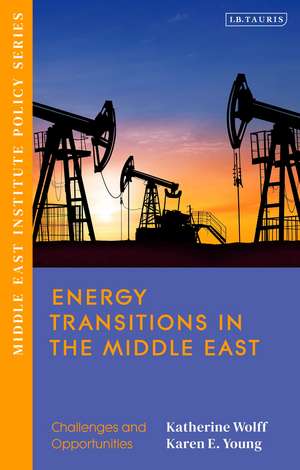Energy Transitions in the Middle East: Challenges and Opportunities: Middle East Institute Policy Series
Editat de Katherine Wolff, Karen E. Youngen Limba Engleză Hardback – 24 ian 2024
| Toate formatele și edițiile | Preț | Express |
|---|---|---|
| Paperback (1) | 135.32 lei 3-5 săpt. | +45.99 lei 7-13 zile |
| Bloomsbury Publishing – 24 ian 2024 | 135.32 lei 3-5 săpt. | +45.99 lei 7-13 zile |
| Hardback (1) | 407.59 lei 6-8 săpt. | |
| Bloomsbury Publishing – 24 ian 2024 | 407.59 lei 6-8 săpt. |
Preț: 407.59 lei
Preț vechi: 561.86 lei
-27% Nou
Puncte Express: 611
Preț estimativ în valută:
77.99€ • 84.98$ • 65.72£
77.99€ • 84.98$ • 65.72£
Carte tipărită la comandă
Livrare economică 23 aprilie-07 mai
Preluare comenzi: 021 569.72.76
Specificații
ISBN-13: 9780755650385
ISBN-10: 0755650387
Pagini: 328
Dimensiuni: 138 x 216 mm
Greutate: 0.52 kg
Editura: Bloomsbury Publishing
Colecția I.B.Tauris
Seria Middle East Institute Policy Series
Locul publicării:London, United Kingdom
ISBN-10: 0755650387
Pagini: 328
Dimensiuni: 138 x 216 mm
Greutate: 0.52 kg
Editura: Bloomsbury Publishing
Colecția I.B.Tauris
Seria Middle East Institute Policy Series
Locul publicării:London, United Kingdom
Caracteristici
Offers insights into new energy sources currently under development in the Middle East, and which ones are likely to be important drivers of the energy transition in the region
Notă biografică
Katherine Wolff is Graduate Research Fellow with the Economics and Energy Program at the Middle East Institute, USA. She studies at Johns Hopkins University School of Advanced International Studies (SAIS), USA where she focuses on Middle East security and energy. Previously she was Associate Director for the Atlantic Council's Middle East Security Initiative.Karen E. Young is Senior Fellow and Founding Director of the Program on Economics and Energy at the Middle East Institute, USA.Previously she was visiting fellow at the American Enterprise Institute, USA. She is the author of The Economic Statecraft of the Gulf Arab States (2023) and The Political Economy of Energy, Finance and Security in the United Arab Emirates (2014) and her analysis has appeared in Bloomberg Opinion, Foreign Policy Magazine, The Financial Times, The New York Times, The Wall Street Journal, and The Washington Post.
Cuprins
1. Front Matter 1.1. IntroductionKaren E. Young, Non-Resident Senior Fellow and Founding Director of the Program on Economics and Energy at the Middle East Institute 2. Financing, Regulation, and Economic Development for the Energy Transition 2.1. A Look Back at 2020: GCC COVID-19 Response, Reforms, Energy Transition Concerns & Micro-Competitiveness Yesar Al-Maleki, Energy Economist and Consultant 2.2. The Future of Gulf NOC-IOC Partnerships Colby Connelly, Research Analyst at Energy Intelligence 2.3. Mechanisms to Finance Climate Investments in the Middle East and North Africa Lama Kiyasseh, Investment Officer at the International Finance Corporation 2.4. Political Priorities and Economic Realities: Financing the Renewable Energy Transition in Saudi Arabia and Oman Piotr G.S. Schulkes, Non-Resident Scholar at the Middle East Institute 2.5. The Political Dimensions of Energy Transition in MENA: A Changing Landscape at the National, Regional, and Global Levels Younes Abouyoub, Chief of Governance and State-Building Division for the MENA Region at the United Nations 3. New Energy Technologies and their Development in the Middle East 3.1. Connectivity, Grids, and Energy StorageJessica Obeid, Senior Global Advisor for Azure Strategy 3.2. The Next Big Thing in MENA Power - Grids, Connectivity, and Energy StorageMichael Tanchum, Professor at Universidad de Navarra 4. Case Studies in the Energy Transition 4.1. Qatar's LNG Industry in the Age of Hydrocarbon Markets Instability and Energy TransitionNikolay Kozhanov, Research Associate Professor at Qatar University 4.2. Renewable Energy Diplomacy: The Gulf States in the Caucasus and Central AsiaLi-Chen Sim, Assistant Professor at Khalifa University 5. ConclusionKaren E. Young, Non-Resident Senior Fellow and Founding Director of the Program on Economics and Energy at the Middle East Institute
Recenzii
An impressive line-up of experts on the Middle East economies and energy systems provides insights into the challenges and opportunities of the energy transition and net-zero. The book gives due weight to the role of the state, the balance of political economy and technocratic solutions, and the international diplomatic role of low-carbon energy. It is extremely timely and relevant to both Middle Eastern and international policymakers seeking to understand how best to launch and benefit from new ventures such as renewable electricity interconnections and hydrogen.






